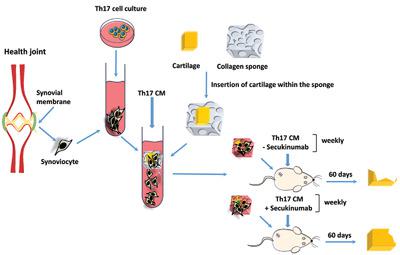当前位置:
X-MOL 学术
›
Eur. J. Immunol.
›
论文详情
Our official English website, www.x-mol.net, welcomes your feedback! (Note: you will need to create a separate account there.)
Th17 lymphocyte-dependent degradation of joint cartilage by synovial fibroblasts in a humanized mouse model of arthritis and reversal by secukinumab.
European Journal of Immunology ( IF 5.4 ) Pub Date : 2020-07-20 , DOI: 10.1002/eji.202048773 Francesca Margheri 1 , Laura Maggi 2 , Alessio Biagioni 1 , Anastasia Chillà 1 , Anna Laurenzana 1 , Francesca Bianchini 1 , Daniele Bani 2 , Manuela Capone 2 , Alessio Mazzoni 2 , Maria Caterina Rossi 2 , Francesco Liotta 2 , Lorenzo Cosmi 2 , Teresa Giani 3 , Rolando Cimaz 4 , Gabriella Fibbi 1 , Francesco Annunziato 2 , Mario Del Rosso 1
European Journal of Immunology ( IF 5.4 ) Pub Date : 2020-07-20 , DOI: 10.1002/eji.202048773 Francesca Margheri 1 , Laura Maggi 2 , Alessio Biagioni 1 , Anastasia Chillà 1 , Anna Laurenzana 1 , Francesca Bianchini 1 , Daniele Bani 2 , Manuela Capone 2 , Alessio Mazzoni 2 , Maria Caterina Rossi 2 , Francesco Liotta 2 , Lorenzo Cosmi 2 , Teresa Giani 3 , Rolando Cimaz 4 , Gabriella Fibbi 1 , Francesco Annunziato 2 , Mario Del Rosso 1
Affiliation

|
How T‐helper (Th) lymphocyte subpopulations identified in synovial fluid from patients with juvenile idiopathic arthritis (JIA) (Th17, classic Th1, or nonclassic Th1) drive joint damage is of great interest for the possible use of biological drugs that inhibit the specific cytokines. Our objective was to clarify the role of such Th subpopulations in the pathogenesis of articular cartilage destruction by synovial fibroblasts (SFbs), and the effect of Th17 blockage in an animal model. SFbs were isolated from healthy subjects and patients with JIA, and peripheral blood Th lymphocytes subsets were obtained from healthy subjects. Fragments of human cartilage from healthy subjects in a collagen matrix containing JIA or normal SFbs grafted underskin in SCID mice were used to measure cartilage degradation under the effects of Th supernatants. JIA SFbs overexpress MMP9 and MMP2 and Th17 induce both MMPs in normal SFbs, while nonclassic Th1 upregulate urokinase plasminogen activator (uPA) activity. In vitro invasive phenotype of normal SFbs is stimulated with conditioned medium of Th17 and nonclassic‐Th1. In the in vivo “inverse wrap” model, normal SFbs stimulated with supernatants of Th17‐lymphocytes and nonclassic Th1 produced a cartilage invasion and degradation similar to JIA SFbs. Secukinumab inhibits the cartilage damage triggered by factors produced by Th17.
中文翻译:

在关节炎的人源化小鼠模型中,滑膜成纤维细胞对Th17淋巴细胞的关节软骨依赖性降解,而苏金单抗可逆转。
幼年特发性关节炎(JIA)(Th17,经典Th1或非经典Th1)患者的滑液中鉴定出的T辅助(Th)淋巴细胞亚群如何引起关节损伤,对于可能使用抑制特异性T细胞的生物药物引起了极大的兴趣细胞因子。我们的目标是弄清此类Th亚群在滑膜成纤维细胞(SFb)破坏关节软骨的发病机理中的作用,以及Th17阻滞在动物模型中的作用。从健康受试者和JIA患者中分离出SFb,并从健康受试者中获得外周血Th淋巴细胞亚群。在SCID小鼠体内,在含有JIA或正常SFbs移植的皮下的胶原蛋白胶原基质中,健康受试者的软骨片段用于测量在Th上清液作用下的软骨降解。JIA SFbs在正常SFbs中过表达MMP9,MMP2和Th17诱导两种MMP,而非经典Th1上调尿激酶纤溶酶原激活剂(uPA)的活性。正常SFb的体外侵入表型受Th17和非经典Th1条件培养基刺激。在体内“逆包裹”模型中,用Th17淋巴细胞上清液刺激的正常SFb和非经典Th1产生的软骨侵袭和降解类似于JIA SFb。Secukinumab抑制由Th17产生的因子触发的软骨损伤。用Th17淋巴细胞上清液刺激的正常SFb和非经典Th1产生的软骨侵袭和降解类似于JIA SFb。Secukinumab抑制由Th17产生的因子触发的软骨损伤。用Th17淋巴细胞上清液刺激的正常SFb和非经典Th1产生的软骨侵袭和降解类似于JIA SFb。Secukinumab抑制由Th17产生的因子触发的软骨损伤。
更新日期:2020-07-20
中文翻译:

在关节炎的人源化小鼠模型中,滑膜成纤维细胞对Th17淋巴细胞的关节软骨依赖性降解,而苏金单抗可逆转。
幼年特发性关节炎(JIA)(Th17,经典Th1或非经典Th1)患者的滑液中鉴定出的T辅助(Th)淋巴细胞亚群如何引起关节损伤,对于可能使用抑制特异性T细胞的生物药物引起了极大的兴趣细胞因子。我们的目标是弄清此类Th亚群在滑膜成纤维细胞(SFb)破坏关节软骨的发病机理中的作用,以及Th17阻滞在动物模型中的作用。从健康受试者和JIA患者中分离出SFb,并从健康受试者中获得外周血Th淋巴细胞亚群。在SCID小鼠体内,在含有JIA或正常SFbs移植的皮下的胶原蛋白胶原基质中,健康受试者的软骨片段用于测量在Th上清液作用下的软骨降解。JIA SFbs在正常SFbs中过表达MMP9,MMP2和Th17诱导两种MMP,而非经典Th1上调尿激酶纤溶酶原激活剂(uPA)的活性。正常SFb的体外侵入表型受Th17和非经典Th1条件培养基刺激。在体内“逆包裹”模型中,用Th17淋巴细胞上清液刺激的正常SFb和非经典Th1产生的软骨侵袭和降解类似于JIA SFb。Secukinumab抑制由Th17产生的因子触发的软骨损伤。用Th17淋巴细胞上清液刺激的正常SFb和非经典Th1产生的软骨侵袭和降解类似于JIA SFb。Secukinumab抑制由Th17产生的因子触发的软骨损伤。用Th17淋巴细胞上清液刺激的正常SFb和非经典Th1产生的软骨侵袭和降解类似于JIA SFb。Secukinumab抑制由Th17产生的因子触发的软骨损伤。



























 京公网安备 11010802027423号
京公网安备 11010802027423号